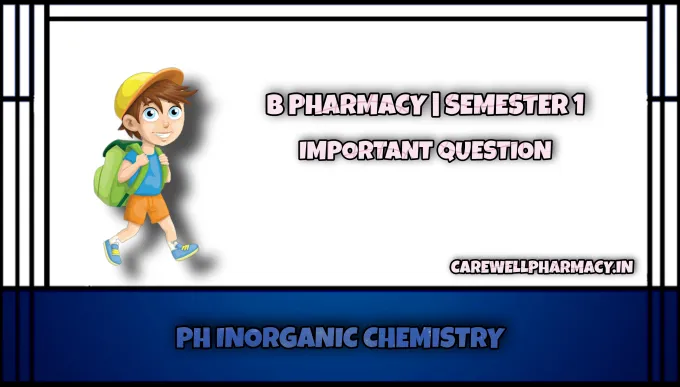Pharmaceutical Inorganic Chemistry is the subject of B. Pharmacy Ist Semester. In this blog, Pharmaceutical Inorganic Chemistry Important Questions is provided which will help the students to do better in their examination and score the better marks.
Pharmaceutical inorganic chemistry deals with the method of preparation, physical or chemical properties of compounds, assay methods and uses of inorganic agents used as pharmaceutical aids and as therapeutics and diagnostics agents.
There is a Table of Content given below which help you to find out your required Unit Important Question. You can click on particular unit which you want to redirect.
| 💡 Table of Content |
|---|
Pharmaceutical Inorganic Chemistry Important Questions [Unit 1]
Ques.1 Write a detail notes on various source of impurities in
pharmaceutical substance and method to minimize these impurities.
Ques.2 Explain the limit test for iron and chloride.
Ques.3 Explain the limit test for lead and arsenic.
Pharmaceutical Inorganic Chemistry Important Questions [Unit 2]
Ques.1 Define buffer isotonic solution, their measurement of
tonicity and also explain the various method for adjusting tonicity.
Ques.2 Write a note on fluoride in the treatment of dental caries
with reference to sodium fluoride.
Ques.3 Write a short note on dentifrices with example of calcium
carbonate.
Ques.4 Write a short note on sodium chloride and calcium
gluconate.
Ques.5 What are electrolytes and write a short note on replacement
therapy.
Ques.6 Write a brief note on Physiological acid base
balance.
Pharmaceutical Inorganic Chemistry Important Questions [Unit 3]
Ques.1 Write a note on acidifiers with example of Ammonium
Chloride.
Ques.2 Define anti microbial agent and their mechanism of action,
give the preparation properties assay and uses of hydrogen peroxide and
chlorinated line.
Ques.3 What are antacids ? Give details of any two antacids.
Ques.4 Write a short note on cathartics. Give details about Kaolin
and bentonite.
Pharmaceutical Inorganic Chemistry Important Questions [Unit 4]
Ques.1 Write a short note on following :-
- Expectorant with ammonium chloride.
- Hematinic with ferrous sulphate.
- Astringent with potash alum.
- Emetics with copper sulphate.
- Poison and antidote with sodium Thiosulphate.
Pharmaceutical Inorganic Chemistry Important Questions [Unit 5]
Ques.1 Write a descriptive note on radiopharmaceuticals.
Ques.2 Define radiopharmaceuticals and elaborate pharmaceuticals
applications.
Ques.3 What are the radioactive compound ? write the properties
of alpha, beta and gamma rays.
Ques.4 Write a note on radioactivity and measurement of
radioactivity.
Ques.5 Write a note on Half-Life.
Pharmaceutical Inorganic Chemistry Important Questions [Very Short]
- Define impurities.
- Define Limit test with one example.
- Define Assay.
- Write the principle involved in the limit test of heavy metal.
- Define Acids.
- Define Buffers.
- Define Buffer Capacity.
- Define Buffer Equation.
- Define Buffer Isotonic Solution.
- What is ORS ? Write its Composition.
- Define Dentifrices.
- Define Anti-Caries Agent.
- Define Zinc Eugenol cement.
- Define Acidifiers.
- Define Antacids.
- Give any two ideal properties of antacids.
- Define cathartics.
- Define Antimicrobial agent.
- Define Expectorant.
- Define Emetics.
- Define Hematinic.
- Define Poison and Antidote.
- Define Astringents.
- Define Isotopes and Isobars.
- Composition of Barium sulphate reagent.
- Give the important of limit test.
- Give the mechanism of KMnO4.
- What is Pharmacopoeia.
- Why Povodine-iodine preferred over iodine as anti infective agents.
- What is isotonicity.
- Write down the chemical formula of sodium Thiosulphate and ammonium chloride.
- Mention the name and formula of two acidifiers.
- What are Lewis Acids and Bases.

0 Comments
Post a Comment